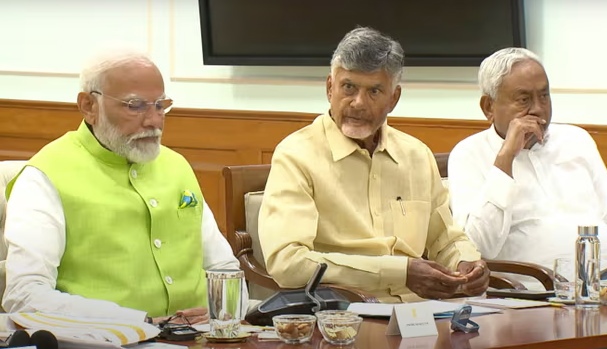Indian PM Narendra Modi will present a coalition agreement to the president on Friday after recent elections forced his party to enlist the help of allies to hang on to power, Indian media reported.
Narendra Modi’s Hindu-nationalist Bharatiya Janata Party (BJP) has been in power for the past decade but failed to repeat its two previous election victories, defying analysts’ expectations and polls. Instead, It had to begin rapid negotiations with a 15-member coalition that agreed to give her parliamentary numbers to run the country.
Modi, along with leaders of allied parties, will visit President Droupadi Murmu on Friday to seek her formal consent to form the next government, the Press Trust of India news agency reported.
The National Democratic Alliance (NDA), which backs Modi’s third term ambitions, “unanimously” chose the 73-year-old prime minister as leader on Wednesday. The alliance has 293 seats in parliament, giving it control over the 543-seat body.
Modi’s party has not disclosed what concessions alliance members made to win their support, but several major parties have claimed significant ministerial portfolios.
The Indian Express newspaper reported on Friday that the Telugu Desam Party (TDP) from the southern state of Andhra Pradesh – the BJP’s biggest ally with 16 seats – will push to revive plans to build a new legislative capital for the state.
The BJP’s second-largest ally, the Janata Dal (United) party from Bihar state, meanwhile is pushing for a review of the controversial army recruitment scheme introduced by the government in 2022 to cut military spending.
Modi’s new dependence on the “minefield of coalition politics” means he faces the prospect of a much tougher-than-expected third term, the Hindustan Times warned in an editorial on Thursday.
Modi’s swearing-in as prime minister
Modi will take the oath of office as prime minister on Sunday. Regional leaders including Bangladesh’s Sheikh Hasina and Sri Lankan President Ranil Wickremesinghe said they would attend the ceremony.
On Tuesday, Modi insisted the election result was a victory that ensures he will continue his programme. Modi told a crowd of cheering supporters in the capital New Delhi after his win:
“Our third term will be one of big decisions and the country will write a new chapter of development.”
Commentators and exit polls had predicted an overwhelming victory for Modi, who is accused by critics of presiding over the jailing of opposition figures and trampling on the rights of India’s 200 million-strong Muslim community. However, the BJP won 240 seats in parliament, far short of the 303 it won five years ago and 32 short of a majority.
Reasons for the BJP’s poor results
Opinion polls had predicted an absolute victory for the ruling party, but the opposition performed much better than expected. Analysts attribute the BJP’s failure to rising prices, high unemployment and the controversial army reform. Another reason cited is Modi’s aggressive campaign, during which the prime minister made some unflattering remarks against the opposition and Muslims. This may have alienated voters in some parts of India.
The opposition, led by Rahul Gandhi, on the other hand, campaigned vigorously despite limited resources and pressure from the government. Several of its prominent figures, including Delhi Chief Minister and Am Aadmi Party chief Arvind Kejriwal, were arrested or under investigation, and tax authorities froze the bank accounts of the Indian National Congress (INC).
The INC has also staked its claim on India’s growing socio-economic inequality and has promised an ostensible census if it wins.
